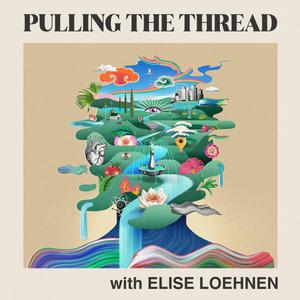
Pulling The Thread with Elise Loehnen
Elise Loehnen and Audacy
- 56 minutes 8 secondsThe Surprising Wisdom of Hope (Jamil Maki, PhD)
“In certain ways, our culture has glamorized the cynic. The person who doesn't have faith in others is seen as maybe wise or especially sharp. And it turns out that that's true in the research as well. If you survey people and you tell them about a cynic and a non cynic and ask them a bunch of questions about those two, most people, 70 percent will tell you that cynics are smarter than non cynics. And 85 percent of people believe that cynics are socially smarter than non cynics. For instance, that they'll be better at spotting liars. In other words, a lot of us put faith in people who don't have very much faith in people, which is ironic and also wrong. It turns out that the data are pretty clear that actually, when we give in to cynicism, we don't just feel bad, which we do, we also judge poorly. We do less well for instance, in spotting who's telling the truth and who's lying, because if you have a blanket default assumption about everybody, you stop actually paying attention to the evidence in front of you that can show you who might be trustworthy and who might not be.”
So says Dr. Jamil Zaki, a professor of psychology at Stanford University and the director of the Stanford Social Neuroscience Lab. Jamil trained at Columbia and Harvard, studying empathy and kindness in the human brain, and I’ve been a mega-fan for years, after interviewing him for his first book, The War for Kindness: Building Empathy in a Fractured World, in 2019. His latest book, Hope for Cynics: The Surprising Science of Human Goodness, is a must-read. It’s a love letter of sorts, a collaboration through the veil with his late colleague Emile Bruneau, who also studied compassion, peace, and hope.
I would love for every single person to read this book as it paints a more accurate, data-driven portrait of who we are, which is mostly good, and mostly aligned in our vision for the future. Jamil explains what happens to us when fear and cynicism intervene and the way we come to see each other through a distorted lens. He busts some other significant myths as well, namely that we glorify cynicism as being “smart”—you know, no dupes allowed—but cynicism actually makes us cognitively less intelligent. Yes, you heard that right. I loved this conversation, which we’ll turn to now.
MORE FROM JAMIL ZAKI, PhD:
Hope for Cynics: The Surprising Science of Human Goodness
The War for Kindness: Building Empathy in a Fractured World
Follow Jamil on X and Instagram
Jamil’s Lab’s Website
RELATED EPISODES:
Amanda Ripley, “Navigating Conflict”
"Calling In the Call-Out Culture with Loretta Ross"
To learn more about listener data and our privacy practices visit: https://www.audacyinc.com/privacy-policy
Learn more about your ad choices. Visit https://podcastchoices.com/adchoices
5 September 2024, 7:01 am - 1 hour 6 minutesFinding Your Inner Mentor (Tara Mohr)
"I was feeling this self censoring and constant push pull in sharing my voice and just feeling quite afraid of going for things that I wanted and so I got really interested in that gap and started to work with people with those clients around the inner critic.
And my first guess was like, oh, we're going to dig into their childhoods and find who was the critical source in their lives that created this voice. And very quickly, I found out that was not going to be my answer because I would hear the exact same adult inner critic in these women. And some were like, my parents were so supportive. And some were like, my parents ignored me, my parents cheered me on, my parents were so critical. And yet this sort of adult, more professionally oriented, more adult selfhood oriented inner critics sounded the same despite this wide range of early experiences. So then I had to look a little more culturally and also biologically.
And what became clear was that that inner critic voice really spoke up when something took us out of our comfort zone, or when we were contemplating something out of our comfort zone. And to place that in a context of gender, for women, what is unsafe and what we very deeply learn is unsafe is visibility, power, too much success, shining bright, standing out from the crowd in some way, all of that."
So Says Tara Mohr, a coach, educator and the author of Playing Big: Practical Wisdom for Women Who Want to Speak Up, Create, and Lead, which is celebrating its 10th birthday this fall. I first met Tara a decade ago and was so taken with her and her insights that we did four stories together—stories that were deeply resonant with women everywhere. These stories were about understanding—and releasing—your inner critic, locating your inner mentor, examining the ways in which you keep yourself in the shadows and why, and the most potent one of them all: why women are so quick to criticize other women. We cover this same ground 10 years on—and it’s just as powerful as it was then. I loved reconnecting with Tara and can’t wait to do more with her over the coming decades, specifically revisioning what it might look like if more women led—but not in a model defined by men, in a way that might be uniquely their own. Okay, let’s get to our conversation.
MORE FROM TARA MOHR:
The Inner Mentor Guided Meditation
Tara Mohr’s Website
Tara’s Online Courses
Playing Big: Practical Wisdom for Women Who Want to Speak Up, Create, and Lead
To learn more about listener data and our privacy practices visit: https://www.audacyinc.com/privacy-policy
Learn more about your ad choices. Visit https://podcastchoices.com/adchoices
29 August 2024, 7:01 am - 55 minutes 44 secondsThe Upper Limit Problem (Katie Hendricks, PhD)
“The whole sense though, of the Upper Limit Problem, is instead of feeling good and then feeling bad, which is how we think it's supposed to work. You know, you feel bad, you feel good, and then you forget to go to your yoga class and then you start eating things that aren't good for you. And pretty soon, you know, you're off binging and you know, that's over. And in partnership, I'd say, The most common Upper Limit Problem is to criticize the other. Criticizing also gets over into contempt. So when your partner expands and you don't support that expansion, but you criticize them and then they come down again or you forget an agreement.
I think those are the two most common is that people don't do what they say they're going to do and they get into criticizing. And we really have seen that criticizing blame and criticism are really relationship killers. But what's underneath that is our fear of expanding and our fear of going out into the unknown, because even the Upper Limit Problem, if you're expanding, you are going to go into the unknown over and over, and we can stay safe and miserable in our familiar patterns, of you'll eat too much, and I'll drink at night, and we won't challenge that in each other, and that way we'll coexist, and many relationships are that way.”
So says Dr. Katie Hendricks, the co-founder of The Hendricks Institute and the co-author of 12 books, including the bestseller, Conscious Loving: The Journey to Co-Commitment. Katie and her husband, Gay, have been leading seminars and workshops for individuals and couples for decades—moving them from their definition of co-dependence into co-commitment. We touch on it in our conversation, but their definition of co-dependence is the only one I’ve heard that makes sense to me as they suggest co-dependence at its simplest is when your behavior is determined by someone else’s—when you are adjusting yourself around someone else in a way that is a disservice to the relationship. Instead, they argue for co-commitment, where everyone takes complete responsibility for their own actions and their own lives. They coach a lot of tools that I love to talk about on this podcast, including the Drama Triangle, and they also coined the concept of the Upper Limit Problem, which is our tendency—just when things are going really well–to self-sabotage. That’s a big focus of our conversation today.
MORE FROM KATIE HENDRICKS, PhD:
Conscious Loving: The Journey to Co-Commitment
The Conscious Heart: Seven Soul-Choices that Create Your Relationship Destiny
The Big Leap, by Gay Hendricks, PhD
Foundation for Conscious Living
Follow Katie & Gay on Instagram
To learn more about listener data and our privacy practices visit: https://www.audacyinc.com/privacy-policy
Learn more about your ad choices. Visit https://podcastchoices.com/adchoices
22 August 2024, 7:01 am - 47 minutes 10 secondsWhy We Overthink (Amanda Montell)
“Those of us growing up in consumerist society, when confronted with a problem, our tendency is to add a whole bunch of cumbersome variables to the equation. So, if we're experiencing pain in our relationship, I'll speak for myself, every time we were really, really suffering and not doing well. It did not occur to me once to break up. I was like, you know what we need to do? We need to go on another vacation. Or we need to get another cat. Or we need to replace all our furniture.
I don't regret any of my cats. But I was like, we need to add variables to the equation in order to fix this problem. Even though the much more efficient decision would have been maybe to scale back, reassess, take something away. And, I quote a study when talking about that subject, where participants were presented with a spatial puzzle involving colored blocks, and they could either solve the puzzle by adding or taking away colored blocks from this puzzle.
The vast majority of participants opted for the much more overly complicated solution, which was to add a whole bunch of color blocks, whereas the much simpler but less intuitive solution would just be to take one single colored block away. We don't often think to take things away to solve a problem.”
So says Amanda Montell, the author of the New York Times bestseller The Age of Magical Overthinking: Notes on Modern Irrationality, as well as Cultish: The Language of Fanaticism and Wordslut. Amanda is a linguistics major from NYU and all of her work centers around the way that words—and thoughts—shape our minds, and how our minds are permeable to other factors, whether it’s the halo effect, confirmation bias, or Cult-like sensibilities. Amanda is also the host of a podcast, “Sounds like a Cult.” Okay, let’s get to our conversation.
MORE FROM AMANDA MONTELL:
The Age of Magical Overthinking: Notes on Modern Irrationality
Cultish: The Language of Fanaticism
Wordslut: A Feminist Guide to Taking Back the English Language
Follow Amanda on Instagram
Amanda’s Website
Amanda’s Podcast: “Sounds Like a Cult”
Amanda’s Newsletter
To learn more about listener data and our privacy practices visit: https://www.audacyinc.com/privacy-policy
Learn more about your ad choices. Visit https://podcastchoices.com/adchoices
15 August 2024, 7:01 am - 53 minutes 54 secondsBeing Better Leaders (Jerry Colonna)
“Human beings trigger other human beings, right? My teacher and friend, Parker Palmer, likes to say, riffing on Socrates, "the unexamined life may not be worth living," but if you choose to live an unexamined life, please don't take a job that involves other people, right? And in classic Midwestern Wisconsin brilliance, Parker's got it, I mean, because what he's saying is that we all have a responsibility to tidy up ourselves as we interact, because we've all been in relationships with people or had encounters with people who are kind of a mess. I often visualize little kids in adult clothes swinging their arms all around and say, Whoa, wait, to use a "Jerry-ism", use radical self inquiry to confront the parts of yourselves that you'd really rather not think about so that you're less likely to project them onto other people and cause damage. And if everybody was doing that, we might create better interpersonal relationships.”
So says Jerry Colonna, founder of Reboot, and one of the most sought after CEO coaches in the world. Before he began coaching executives, Jerry was a burnt out VC, convinced that there must be a better way to impact the world—and also convinced that if he could influence the upper reaches of corporate structures, if he could help leaders heal, he could vastly improve the lives of all the employees. After all, he had observed the ripple effect of unhealed emotional wounds being taken out on other people—specifically people with less power. This is the focus of Jerry’s two great books about leadership: His first one is Reboot: Leadership and the Art of Growing Up and his second is Reunion: Leadership and the Longing to Belong, which takes a probing look at power and privilege and how it can alienate those who already don’t feel like they belong. In today’s conversation, we talk about all of this and specifically one of Jerry’s main queries. This passage is from Reunion: “While necessary, it’s not enough for us to do the inner work of unpacking our childhood wounds and, with fierce radical self-inquiry, free ourselves from the need to reenact the old stories of our pasts. Radical self-inquiry that stops at the question of how we have been complicit in creating the conditions we say we don’t want—a core tenet of my coaching and my book Reboot—is insufficient if it fails to look out to the world as it exists and ask how it could be better.”
MORE FROM JERRY COLONNA:
Reunion: Leadership and the Longing to Belong
Reboot: Leadership and the Art of Growing Up
Follow Jerry on Instagram
To learn more about listener data and our privacy practices visit: https://www.audacyinc.com/privacy-policy
Learn more about your ad choices. Visit https://podcastchoices.com/adchoices
8 August 2024, 7:01 am - 54 minutes 53 secondsStaying with Discomfort (Thomas Hübl)
“Many of us needed to suppress anger. And what you feel in your throat is an intelligent mechanism to suppress the intensity because it threatened the belonging, most probably the original family. And so when we say, oh, it's not that I cannot experience my anger, it was intelligent to suppress it at certain moments in my development or my life, to not threaten the attachment relation or to not threaten the belonging. And now we begin to get to know the intelligence and the more we re own that, the more the expression will happen naturally because some people say I cannot express it, which I think is the shadow version of, oh, I was able to suppress it and it was really needed. And at that time, it was really better for me to do that than to be angry”.
So says spiritual teacher Thomas Hübl who is back for the second part of a series we’ve decided to undertake. If you missed part one, I’d recommend giving it a listen—it ran last week—though there is no test! You can pick up with this episode and you won’t be lost. Thomas is one of my favorite thought partners because of his presence—he can build and hold an incredible amount of space, which I hope is perceptible to all of you who are tuning in from afar. I can feel it through the computer. In today’s episode, we went deeper into our conversation about finding “bad” feelings in our bodies, sitting with discomfort, and learning how to move these sensations up and out. We talked about our collective responsibility to build this capacity—particularly if we’re not deep and directly in suffering ourselves—and why these deposits of collective trauma stick around for so long. On this final point—the presence of dark and dense entities that you can sometimes sense or feel, particularly in highly traumatized parts of the globe—we’re going to devote an entire episode. So stay tuned for Part Three, coming later this fall.
MORE FROM THOMAS HÜBL:
Part One on Pulling the Thread: “Finding Shadow in the Body”
On Pulling the Thread: “Feeling into the Collective Presence”
On Pulling the Thread: “Processing Our Collective Past”
Thomas’s Podcast, Point of Relation
Attuned: Practicing Interdepence to Heal Our Trauma—and Our World
Healing Collective Trauma: A Process for Integrating Our Intergenerational and Cultural Wounds
Thomas Hübl’s Website
Follow Thomas on Instagram
To learn more about listener data and our privacy practices visit: https://www.audacyinc.com/privacy-policy
Learn more about your ad choices. Visit https://podcastchoices.com/adchoices
1 August 2024, 7:01 am - 54 minutes 17 secondsReally Hearing Our Own Voices (Carol Gilligan): GROWING UP
“What I became aware of when I started writing about resistance, and I thought, the healthy body resists infection. We have an immune system. And the healthy psyche resists a culture that's going to infect us psychologically, that's going to keep us from basically being able to function psychologically. And what I realized is that there is, I mean, you see little boys going to school and they come up against it in this school, pre-kindergarten, kindergarten, where to be one of the boys they have to be tough. And then you see girls and adolescents coming into, where to be included, not excluded, to be one of the girls that people want to be with. And that's when you get there. You have to be nice. You have to be seemingly perfect. You know, she's good at everything. She's good at drawing and she's good at sports. And she never, you know, that kind of thing. And so what I'm trying to say is there's a force in the world that you're up against with this kind of stuff. It's not just coming from inside people.”
So says Dr. Carol Gilligan, esteemed professor and developmental psychologist, who is the author of a landmark book called In a Different Voice—a book that I talk about and write about all the time. Back in the ‘80s—Gilligan is 87 now and still working—she looked at all the research from the likes of Lawrence Kohlberg and Piaget and made a stunning and obvious realization: These developmental psychologist giants had only ever studied boys. Typically white, middle-class boys. In response, Gilligan did a study on girls and moral development, a groundbreaking look into how culture genders our response to the world: Gilligan found that for girls, morality is relational and rooted in care—not so much law—and that fear of separation from relationship encouraged these girls to stop saying what they know. She struggled to get this study published—it was rejected multiple times—and has since become the most requested reprint out of Harvard. It also became the subject of In a Different Voice, which has sold 500,000 copies—unheard of in academic publishing. Everything that Carol Gilligan shares with us in this conversation is a revelation and also deeply resonant—and something you will know to be true. Before I go, if you missed Niobe Way’s episode from a few weeks ago, tune in to that next—Niobe was Carol’s student, and has done for boys what Carol has done for girls.
MORE FROM CAROL GILLIGAN:
Carol Gilligan’s Website
Niobe Way’s Episode: “The Critical Need for Deep Connection”
FROM MY NEWSLETTER:
“What Valley Girl’s Tell Us”
“What Are We ‘Really, Actually” Saying
“Why is it So Hard to Scream?”
EPISODES IN THE “GROWING UP” SERIES:
Niobe Way, “The Critical Need for Deep Connection”
Harvey Karp, M.D., ”The Long-Term Implication of Sleep”
Carissa Schumacher
To learn more about listener data and our privacy practices visit: https://www.audacyinc.com/privacy-policy
Learn more about your ad choices. Visit https://podcastchoices.com/adchoices
29 July 2024, 7:01 am - 53 minutes 28 secondsFinding Shadow in the Body (Thomas Hübl)
“I often ask, ‘so how beautiful are you when you need something?’ I call this the beauty of needs. And it's amazing how many of us don't feel beautiful at all when we need something. Like all kinds of other things come up: I'm needy, I feel ashamed, I feel young, I feel afraid, I feel whatever, I feel ugly. Sometimes a hundred people raise their hand and say, I don't feel beautiful at all. But I think given what you said with the anger and the need, I think also the quality of shame, that we feel ashamed to ask because so often that wasn't appreciated and couldn't be contained and that we don't feel beautiful or we don't feel our dignity when we need something.”
So says Thomas Hübl, who you’ve likely heard on my podcast before. This conversation actually happened on his podcast, The Point of Relation, and we went so deep, we decided we needed to do a Part Two, which is coming to you next week. Thomas is the author of two excellent books on collective trauma and resonance: Attuned: Practicing Interdependence to Heal Our Trauma—and Our World and Healing Collective Trauma: A Process for Integrating Our Intergenerational and Cultural Wounds. He does work all over the globe in geographic pockets where a lot has happened, helping people create containers to move the energy up and out. In this conversation, we talked about locating “bad” feelings in our bodies—specifically in the context of On Our Best Behavior—though the practices we discuss here are applicable to anything.
MORE FROM THOMAS HÜBL:
On Pulling the Thread: Feeling into the Collective Presence”
On Pulling the Thread: “Processing Our Collective Past”
Thomas’s Podcast, Point of Relation
Attuned: Practicing Interdependence to Heal Our Trauma—and Our World
Healing Collective Trauma: A Process for Integrating Our Intergenerational and Cultural Wounds
Thomas Hübl’s Website
Follow Thomas on Instagram
To learn more about listener data and our privacy practices visit: https://www.audacyinc.com/privacy-policy
Learn more about your ad choices. Visit https://podcastchoices.com/adchoices
25 July 2024, 4:01 am - 1 hour 31 minutesSigns of High Intuition (Carissa Schumacher): GROWING UP
“When you have a feeling, you can recognize when it's a feeling, when it's a knowing, a lot of knowers, especially automatic channel writers, are like, did I write this? Was I channeling? Did Mary Magdalene write that, you know, where is this coming from? And so they do have the tendency, knowers, to really second guess themselves some of the time or to think I probably made this up or it was a mental thing or primed in my brain. And so with knowers, I really work on helping them to trust what is coming to the surface and not only to trust the knowing, but also to express that knowing. And so one of the qualities of intuitive children, if anyone listening has ever had a child that is just playing, trucks, Barbies, whatever, just playing and then turns around and just says the most profound, wise thing you have ever heard in your life to the point that you're like, are you like Buddha? You have a knower child”.
So says Carissa Schumacher, who long-time listeners will recognize from this podcast. Carissa is an incredible forensic medium—which means that yes, sometimes the police call on her for assistance in solving crimes and yes, she also talks to people on the other side. But as of the end of 2019, she’s also a full-body channel for Yeshua, or Christ Consciousness. This might sound wild—and it is wild—but what’s expressed during these transmissions is also incredible. It’s deeply resonant, lyrical, and profound wisdom that feels so true—and sometimes counterintuitive—that it doesn’t really matter who is its author. Carissa and by extension, Yeshua, have been guiding lights for me in the past four years bringing me ever closer to myself. If you have an opportunity to go to one of Carissa’s journeys and you feel called, do it. They can be life-changing, in both overt and slowly unfolding ways.
I asked Carissa to join me for this special series on GROWING UP because I wanted to ask her about highly sensitive children, empathy, and intuition—both its presence in all of us, and what happens as we grow up that causes it to shut down. For highly sensitive people—of which I know there are many who listen to this podcast, hopefully you’ll hear your own experiences reflected here. For parents of highly sensitive children, I hope what you hear will help. Conversations with Carissa are never short though, so we cover a lot of other ground from recent transmissions—the “in-reality self” versus “the in-theory self” and so much more.
MORE FROM CARISSA SCHUMACHER:
The Freedom Transmissions: A Pathway to Peace
Carissa’s Website
Energy Healer Uta Opitz’s Website
PREVIOUS EPISODES WITH CARISSA:
“Yeshua: Integration not Eradication”
“Understanding Spiritual Power”
“My Spiritual Teacher and Yeshua Channel”
EPISODES IN THE “GROWING UP” SERIES:
Niobe Way, “The Critical Need for Deep Connection”
Harvey Karp, M.D., ”The Long-Term Implication of Sleep”
To learn more about listener data and our privacy practices visit: https://www.audacyinc.com/privacy-policy
Learn more about your ad choices. Visit https://podcastchoices.com/adchoices
22 July 2024, 7:01 am - 45 minutes 55 secondsThe Life-Saving Power of Friendship (Mark Nepo)
“The real meaning of ‘remember’ is to put the members back together, to make whole. So a lot of times we go back in time to a special time or a special moment and nostalgia is wanting to go back there, as if there's something there that we lost. And the true value of memory is to touch that moment and see where it lives or is dormant in me or you now going forward. That was one form or expression of it, not the only. And that touches on, I think what friendship helps us remember is that life is always where we are. We suffer greatly this–and it has always been, but more so in the modern world–this menacing assumption that life is other than where we are. If it's over there, if I could just get over there, even with a dream, or if I could just accomplish this dream, then. And I think one of the things that almost dying taught me was that there's no there, there's only here.”
So says poet and author Mark Nepo, who has now written nearly 30 books, including mega-bestsellers like The Book of Awakening. In this latest book, You Don’t Have to Do It Alone, Mark explores the power of friendship to lend life both vital energy and more meaning, likening friends not to the boat, but to the oars that can help you reach the other side of the water. I’ve been thinking a lot about boys and men lately—including the ways in which they suffer under patriarchy too, sometimes in more devastating ways. I’m grateful for people like Mark who are insisting and modeling that to care is to be human—and that intimate friendships are vital for all of us who hope to lead long and meaningful lives. Women have an easier time of this, though we can all benefit from reminders.
MORE FROM MARK NEPO:
You Don’t Have to Do It Alone: The Power of Friendship
Mark Nepo’s Website
Follow Mark Nepo on Instagram
To learn more about listener data and our privacy practices visit: https://www.audacyinc.com/privacy-policy
Learn more about your ad choices. Visit https://podcastchoices.com/adchoices
18 July 2024, 7:01 am - 54 minutes 20 secondsThe Long-Term Implications of Sleep (Harvey Karp, M.D.): GROWING UP
“I remember a wonderful psychologist was talking about, we shouldn't, should on ourselves. Don't should on yourself. And it's all of what I should do. And there's a big lie for new moms, which is that when the baby is born, you should take care of the baby. You're the best person. You're the mother. There's no one else who's going to take care of your baby in the same way. And of course you should be holding skin to skin, have the opportunity to breastfeed. But there was never a mother who was expected to take care of her baby without the help of her aunt and her grandmother and her sister and things like that. And if you think about it, in the hospital, there's only one place where we make patients take care of other patients, right?”
So says Dr. Harvey Karp, author of The Happiest Baby on the Block which has Bible-like status in the world of parenting. As a beloved Los Angeles pediatrician, Harvey punctured the mainstream with the 5 S’s—swaddling, shushing, swinging, sucking, and holding the baby on its side—all simple interventions that helped parents help their newborns sleep. This was revolutionary—and certainly changed my trajectory as a new parent, as getting five straight hours instead of three can have a huge impact on your mental health. Harvey then codified his findings into “The Snoo,” a bassinet that functions as an extra set of hands: It swaddles, swings, shushes, and keeps the baby safely on its back while it sleeps. In today’s conversation we talk about what it would look like to institutionalize support of new parents, what Harvey’s trying to do about this, why it can be so awful, isolating, and hard to have kids, along with the advice most parents frequently seek. I’m lucky to call Harvey a friend and to be able to turn to him over the years—in fact, Sam slept in a prototype Snoo—so I’m thrilled to share some of his wisdom with all of you. Let’s turn to our conversation now.
MORE FROM HARVEY KARP, M.D.:
The Happiest Baby on the Block
The Happiest Toddler on the Block
Follow Happiest Baby on Instagram
EPISODES IN THE “GROWING UP” SERIES:
Niobe Way, “The Critical Need for Deep Connection”
To learn more about listener data and our privacy practices visit: https://www.audacyinc.com/privacy-policy
Learn more about your ad choices. Visit https://podcastchoices.com/adchoices
15 July 2024, 7:01 am - More Episodes? Get the App
Your feedback is valuable to us. Should you encounter any bugs, glitches, lack of functionality or other problems, please email us on [email protected] or join Moon.FM Telegram Group where you can talk directly to the dev team who are happy to answer any queries.
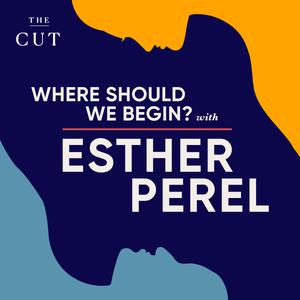 Where Should We Begin? with Esther Perel
Where Should We Begin? with Esther Perel
 The goop Podcast
The goop Podcast
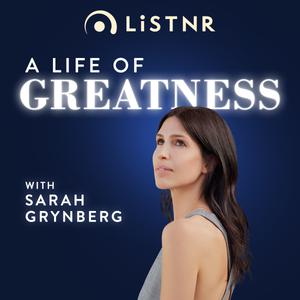 A Life of Greatness
A Life of Greatness
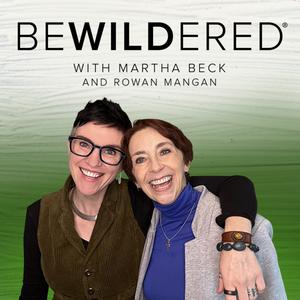 Bewildered
Bewildered
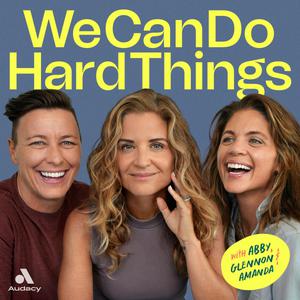 We Can Do Hard Things
We Can Do Hard Things
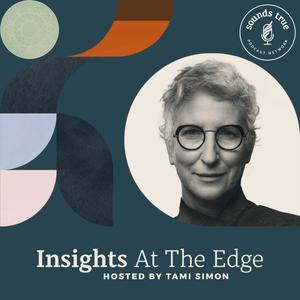 Sounds True: Insights at the Edge
Sounds True: Insights at the Edge